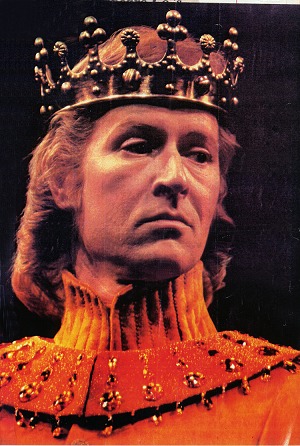The last Stratford-on-Avon Richard II, based on the notion of the King and Bolingbroke as mirror images of each other, is a pretty hard act to follow. But the new Terry Hands production, secure, glittering, imagistic and even pageant-like, not only gives Alan Howard the chance to add another to his brace of kings but also firmly projects the idea that time is the real hero of this play, even if it doesn't get a programme credit.
At the start, thanks to Farrah's opulent designs, we are in a burnished copper world where the king and his lords stand out like cathedral effigies. For the lists at Coventry (and how the place has gone downhill since) we even see a tilted wooden stage lowered to reveal Richard on a golden throne with a white hart at his feet and brave banners behind. It is a world of ritual, ornament and excess, evoking Richard's "rash fierce blaze of riot." But by the end we are plunged into a society of darkness, gloom, flickering torches, and of men signing documents in small back rooms.
But this is much more than a morality play, riches to rags, Richard II. It gains its strength from the way it implies both past and future. Behind the folderol, Alan Howard's Richard is from the start a nervy monarch casting doubtful glances at Bolingbroke when he asks what would happen "were he my kingdom's heir." And David Suchet's Bolingbroke suggests a whole history of trouble ahead when, having seized the crown from Richard, he offers it to Northumberland to carry, and thinks better of it.
